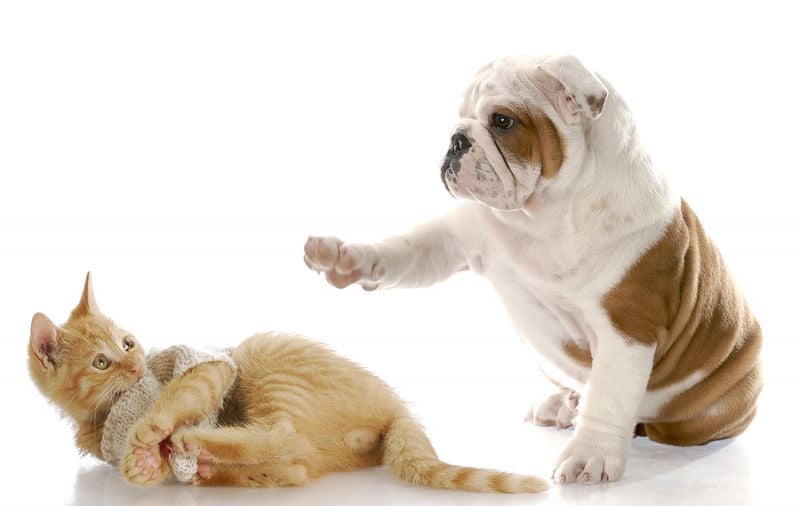
This is a placeholder text
Group text
 The Importance of Socializing Your Dog
The Importance of Socializing Your Dog
The personality of a dog is flexible and indeterminate. Dogs can be exuberant or shy; friendly or hostile; fearful or bold; aggressive or passive or some combination of the above. These differences in personality may to some extent be determined by breed, or individual genetics, but for the most part it is based on how and to what extent each particular dog has been socialized.
So what is socialization? Simply put, this is the process where a dog learns to relate to people, other dogs and other animals based on direct experience. You are certainly aware that the relationship your dog has with you is based on the exposure you have had to each other, and whether or not it has been positive or negative. This same principle extends to the relationship your dog is going to have with other living beings – it is based on both the quality and quantity of his exposure to those beings. The one difference is that while your relationship with your animal is a specific, one-to-one connection, socialization is more general and category-based. In other words, if your dog learns during the socialization process that strangers or other dogs should be met with trust and openness, then he will learn to treat any strangers or dogs he might encounter in the future with the same kind of positive attitude he learned when he was younger.
Socialization begins at Home
It is important that socialization begin early in life. Between the ages of three and twelve weeks, a puppy will be sensitive to socializing experiences, meaning that any positive contacts he has with other living beings will make an impression that lasts into later life. The one problem, however, is that at this age the outside world is still a dangerous place for a puppy. His immunizations have only just begun, and he is not as resistant to potentially deadly infections as he will be later in life. At this tender age, a puppy should be kept in protected environments, meaning basically your home and perhaps your backyard. So, his socialization at this stage will be limited to contact with those beings that are sharing his living space – you, your other family members, and any other dogs, cats or other pets you might have.
Socialization with humans at this stage is relatively unproblematic. Touch him, pet him, hold him, play with him, speak to him in a soft and friendly voice, make sure any strangers who visit either greet the dog in friendship or stay away completely and you should get the desired result – a dog who is generally trusting and friendly with people. If he is part of a litter then he can learn to socialize with other dogs through his siblings and parent; but of course in most instances a puppy will be separated from the litter relatively early, so this kind of natural socialization may not be possible. If there is a cat or other dog in your home when the puppy arrives, the main thing is to make sure that the introductions to these other animals is a very gradual process, so that they can all get to know each other in a completely non-threatening context.
Puppy School
At about the age of three months, your puppy should be ready to leave the house to meet other dogs. Puppy school is highly recommended by veterinarians, dog trainers, and other experts because it will teach young dogs how to relate to others of their own species. The purpose of puppy school is to give your young dog a chance to play with other young dogs of varying breeds, so he will learn to view other dogs as friends, not enemies.
While puppy schools are meant to introduce dogs to other dogs in a positive environment, the also play an important role in the relationship between dogs and human beings. One of the crucial things puppies learn in their interactions with other puppies is bite inhibition. Biting during play is natural and frequent, but what a young dog will learn is that if he bites too hard and causes pain, then the dog he has bitten will not want to play with him anymore, and that is something very bad. Biting etiquette is what we are talking about here, and this is something that will extend into a dog’s relationships with human beings. If there is a neighborhood dog that everyone avoids because he bites, you can be sure that this dog did not get the chance to learn biting etiquette by playing with other dogs when he was younger.
The Importance of Continuing the Process
Socialization begins early in life, but it is a process that can never stop. Dogs enter certain periods of their lives when hostile or fearful behavior can manifest, even if they have been well socialized before. Adolescence is the first such period; around the age of four and a half months (the beginning of adolescence for most dogs), they can go through sudden personality changes, becoming willful and aggressive – just like human teenagers. This is one reason why puppy school should be started after the age of three months, so that your dog will still be there when he enters adolescence and there is the opportunity for skilled trainers to help him get past his anxiety and uncertainness.
Many dog owners have experienced these kinds of personality changes when their dogs are between the ages of eight months and two years. The important point to realize is that the process of socialization must be ongoing and perpetual. You should take your dog into public places, like parks, where he can be exposed to new dogs and people each and every day if possible. You might even want to arrange play dates with other dog owners to make sure your dog continues to have rewarding and fun contacts with other dogs throughout his life.
If your dog starts reacting with hostility to other animals or humans, it is recommended that food be used to help him change those reactions. Give him treats whenever strange dogs, cats, or people approach or visit, so he comes to associate new acquaintances with the pleasures of food. Pretty soon, he will make a connection in his mind and his hostility in the presence of other living beings will turn to feelings of acceptance and welcome.
Socialization is important because it will determine what kind of personality your dog is going to have. You want him to be welcoming, friendly, and trusting; this means you will have an animal companion who is a pleasure to be around, for everyone in the family. It also means you won’t have to worry about getting sued because your dog has been attacking people or their pets. And most importantly, it is what is best for your dog, because a well-socialized dog is a happy dog, and that is what any dog owner should want most of all.
Contact information Disclaimer Privacy Statement Copyright Information Terms of Service Cookie policy ↑ Back to top





